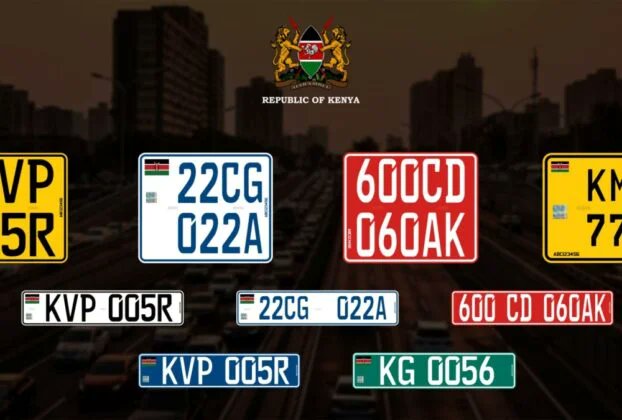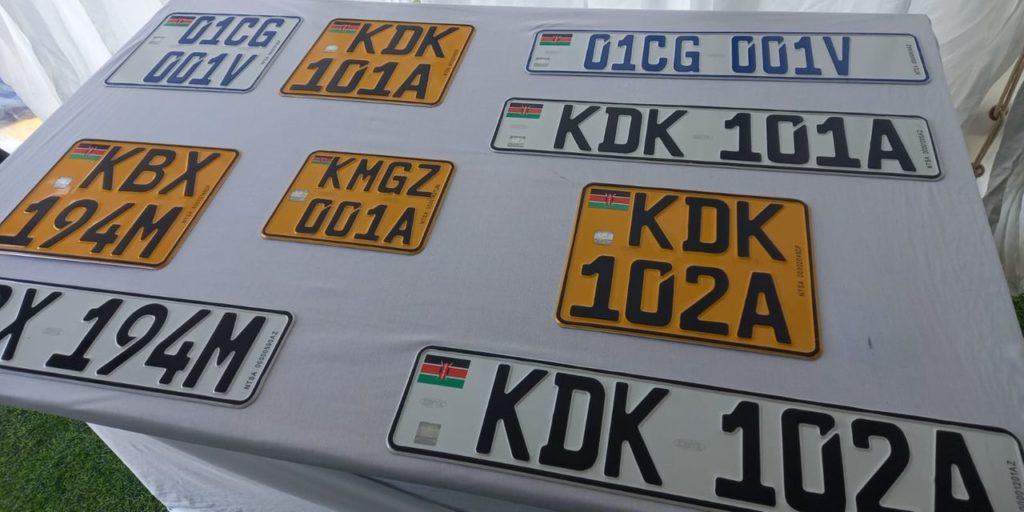Investigations
How Brokers Exploit Buyers in KD Number Plates Scam

New car buyers in Kenya are now being targeted by a sophisticated scam involving KD number plates. Dealers and brokers have found ways to exploit the lack of awareness among motorists about how temporary registration plates work.
Many unsuspecting buyers believe these plates are fully legitimate, only to later discover that their cars are uninsured or that they have been paying unnecessary daily rental charges.
This growing scheme not only risks financial loss but also places new car owners in legal danger on the roads.

Experts warn that new buyers must be extremely careful when dealing with KD number plates. First, never accept temporary plates without seeing the NTSA authorization. Second, always confirm that the insurance policy is comprehensive and tied to the actual car, not just the temporary plate. [Photo: Courtesy]
How KD Number Plates Scam Works
KD number plates were introduced to help new car buyers drive legally while waiting for their permanent registration plates from the National Transport and Safety Authority (NTSA). The plates, where KD stands for “Kenyan Driver,” are meant to be a short-term solution for vehicles in transit.
But fraudsters have turned this system into a money-making machine. Car brokers, exploiting the ignorance of first-time buyers, provide the plates under shady terms. Instead of being included in the normal car purchase process, some brokers rent out the KD plates to buyers on a daily basis.
Worse still, these plates often come without valid insurance. If an accident occurs, the driver has no legal protection, leaving them financially stranded. A green KD plate may look genuine, but without NTSA backing and proper insurance coverage, it is worthless in the eyes of the law.
Insurance Hoax Targeting New Buyers
Many motorists wrongly assume that once they get KD plates, they are safe to drive. This gap in knowledge gives brokers the perfect chance to run insurance scams.
Take the case of a woman who bought her car in August 2024. She shared that she drove for nearly six months without valid insurance. When she purchased the car, she paid what she thought was a lump sum for comprehensive insurance.
Instead, her broker registered the insurance under the KD number plate, not the car itself. By the time her permanent plates arrived, the policy had almost expired. She only found out when a traffic officer flagged her down.
“Once my number plates came in, I was given an insurance sticker by my dealer. I had no idea they gave me a sticker which was supposed to run for only a month. The comprehensive cover I paid for actually went to the KD number plates, which I only used for two weeks,” she explained.
Her ordeal highlights a dangerous loophole. Buyers often trust brokers and dealers blindly, only to find themselves on the road uninsured.
How Brokers Inflate Costs with Fake Delays
Another trick in this scam involves rental fees. Some brokers claim that NTSA is taking too long to issue permanent plates. They then convince buyers to keep paying a daily rental charge for the KD plates.
In reality, some of these plates are not even authorised. Brokers recycle the same KD plates for multiple clients, each paying a fee for plates that are not properly registered.
This leaves buyers doubly exposed: not only do they risk driving illegally, but they also burn money on charges that should never exist.
NTSA officials have urged buyers to demand proof of genuine registration and insurance documents. Unfortunately, many only discover the fraud when they get into trouble with law enforcement or in the aftermath of accidents.
What Buyers Should Do About KD Number Plates
Experts warn that new buyers must be extremely careful when dealing with KD number plates. First, never accept temporary plates without seeing the NTSA authorization. Second, always confirm that the insurance policy is comprehensive and tied to the actual car, not just the temporary plate.
If a dealer or broker insists on unusual fees, that should be a red flag. Buyers also have the right to bypass brokers entirely and purchase insurance directly from reputable firms. This ensures they are covered and prevents the risk of falling into insurance traps.
The scam is growing because it preys on ignorance. Car buyers in Kenya must understand that KD plates are only a temporary bridge, not a permanent licence to drive without scrutiny. Unless NTSA cracks down hard on fraudulent brokers, more new car owners will continue to fall victim to this scheme.
Kenya Insights allows guest blogging, if you want to be published on Kenya’s most authoritative and accurate blog, have an expose, news TIPS, story angles, human interest stories, drop us an email on [email protected] or via Telegram
-

 Grapevine1 week ago
Grapevine1 week agoAlleged Male Lover Claims His Life Is in Danger, Leaks Screenshots and Private Videos Linking SportPesa CEO Ronald Karauri
-

 Lifestyle2 weeks ago
Lifestyle2 weeks agoThe General’s Fall: From Barracks To Bankruptcy As Illness Ravages Karangi’s Memory And Empire
-

 Grapevine4 days ago
Grapevine4 days agoRussian Man’s Secret Sex Recordings Ignite Fury as Questions Mount Over Consent and Easy Pick-Ups in Nairobi
-

 Investigations2 weeks ago
Investigations2 weeks agoEpstein Files: Sultan bin Sulayem Bragged on His Closeness to President Uhuru Then His Firm DP World Controversially Won Port Construction in Kenya, Tanzania
-

 Business2 weeks ago
Business2 weeks agoKRA Can Now Tax Unexplained Bank Deposits
-

 Investigations1 week ago
Investigations1 week agoEpstein’s Girlfriend Ghislaine Maxwell Frequently Visited Kenya As Files Reveal Local Secret Links With The Underage Sex Trafficking Ring
-

 Investigations1 day ago
Investigations1 day agoMulti-Million Dollar Fraud: Three Kenyans Face US Extradition in Massive Cybercrime Conspiracy
-

 News2 weeks ago
News2 weeks agoState Agency Exposes Five Top Names Linked To Poor Building Approvals In Nairobi, Recommends Dismissal After City Hall Probe
















